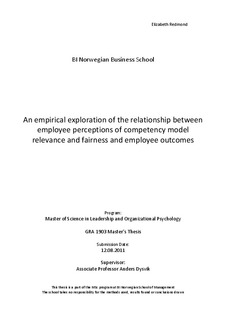An empirical exploration of the relationship between employee perceptions of competency model relevance and fairness and employee outcomes
Master thesis
Permanent lenke
http://hdl.handle.net/11250/94867Utgivelsesdato
2012-04-26Metadata
Vis full innførselSamlinger
- Master of Science [1621]
Sammendrag
A competency model is a written description of desired employee competencies that are derived from the firm’s corporate strategy (Mansfield 1996) and intend to influence strategically aligned behavior (Sanchez and Levine 2009). Competency models have “exploded onto the field of human resources” (Shippmann et al. 2000, 704), yet there is little empirical knowledge of how employees perceive and respond to them. Following research indicating that employee perceptions of HR practices are the better indicator of their potential to produce performance outcomes (Edgar and Geare 2005), and calls for future research to assess how specific HR practices influence employee behavior (Wright and Boswell 2002), the present research seeks to contributes to our understanding of competency model effectiveness as tools of HRM by empirically exploring how employees perceive and respond to them, and how variances in individuals’ perceptions result in different outcomes. Analysis of 278 employees across four service organizations in Norway showed that perceptions of competency model relevance and fairness were positively related to work effort, organizational citizenship behaviors, employability orientation, and career development activities, but not work quality. Perceptions of social exchange relationships were found to at least partially mediate the positive relationships between competency model perceptions and employee outcomes. Implications and future research directions are discussed.
Beskrivelse
Masteroppgave(MSc) in Master of Science in Leadership and Organizational Psychology - Handelshøyskolen BI, 2012
